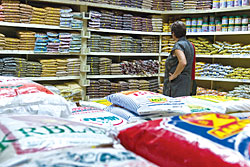|
|
Supermarket shelves are emptying throughout the world. From Argentina to the UK to Japan politicians have worried looks and the newspapers are gravely charting the rising food prices and dwindling stocks.
In Haiti, the food crisis has already toppled the government. Haitian governments are toppled famously easily, but even in India, the UPA government may lose the next election if the opposition exploits the issue resourcefully enough. The Chinese state think-tanks are working overtime to ensure that the country's vast infrastructure and resources are able to supply food to all of its vast population.
In Nepal, the focus has been on the upcoming government in the constituent assembly, so the food issue has not been much more than a few reports in the papers. But we should not ignore this matter. If inflation fuelled by the food shortage gets out of control no one knows where it might stop. Nepal is lucky to have its currency pegged to the Indian rupee, which is still strong against the US dollar. But a big devaluation of the rupee, as happened in the early nineties could lead to chaos here as much as in India.
The global food shortage is being exacerbated by growing consumption of both foodstuffs and other commodities, which is now close to outstripping supply.
Consumption has increased on four counts. Firstly, the growing affluence in developing countries is increasing the demand for grain. Secondly, the advent of large retail stores like supermarkets and hypermarts which stock a large quantity and variety of foodstuffs means that more food is in the storeroom. Thirdly, people are eating more meat, which necessitates more grain to feed more animals. And fourthly, now that the search is on for renewable energies and alternatives fuels, much former cropland is being given over to producing biofuels.
The rise in oil prices has only made matters worse. The cost of transportation is increasing at a phenomenal rate and it is probably not long till a time when in landlocked countries like Nepal, the transportation costs will start to form a large portion of the retail price. Spiralling prices for food and other basic items will naturally hit the public's purchasing power, and then of course it is only a matter of time until possibly violent demands for wage increases start to surface.
These are the times when data, research and economic think-tanks become useful. Unfortunately in Nepal, we know little about the impact of urbanisation and the absence of land use laws on agricultural production. We don't understand the link between fuel prices, transportation costs and retail rates. We are unaware of the supply chain and find it difficult to detect hoarding of foodstuffs. What is the relationship between the changes in eating patterns amongst urban youth and the availability of various food commodities? What has been the impact of large retail stores on supply and consumption? Due to a lack of professional and theoretical expertise, we are still barely equipped to answer these questions.
Now as the CPN (Maoist) forms a new government, the challenges from basic issues of food supply and inflation are greater and more dangerous than they have been for several decades. If the government does not formulate and implement hard-headed and well-considered policies to ride this storm, then they are likely to spend more of their time extinguishing burning tyres than writing a new constitution.




